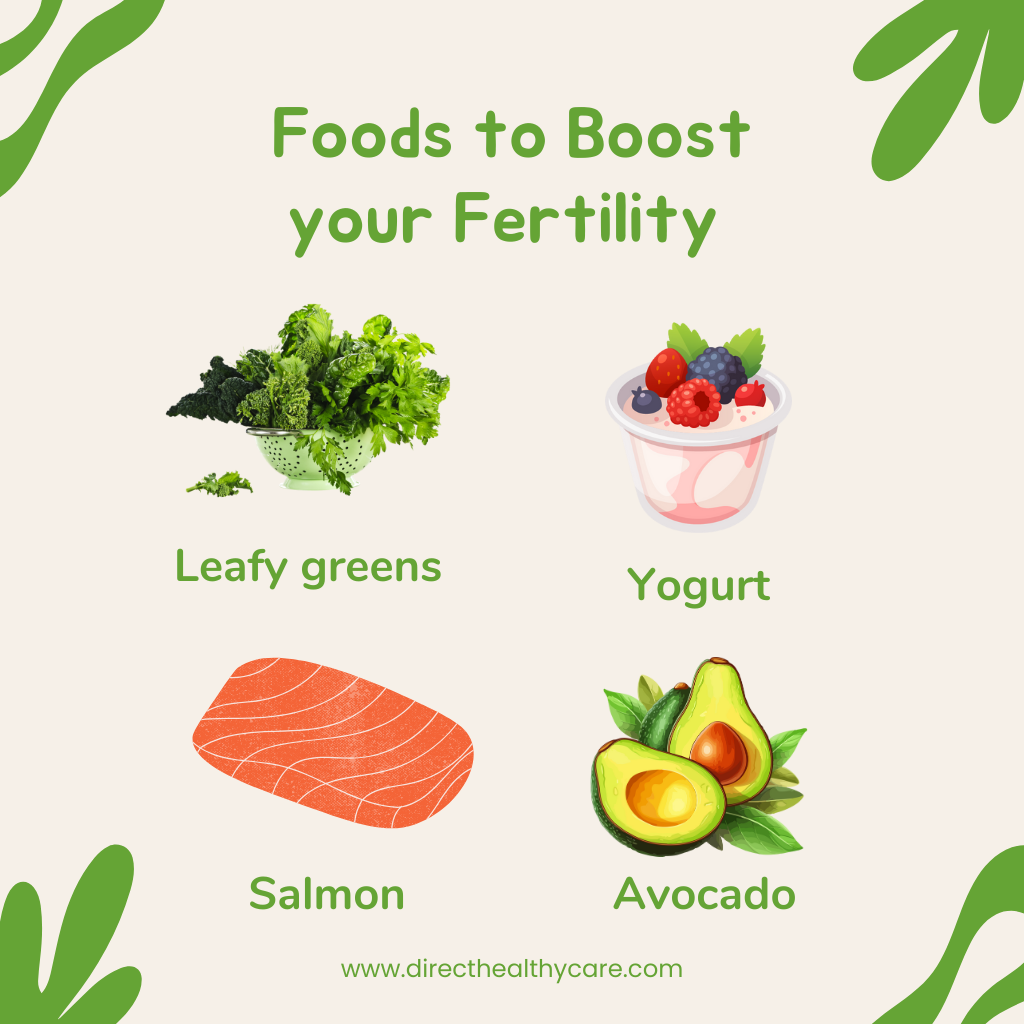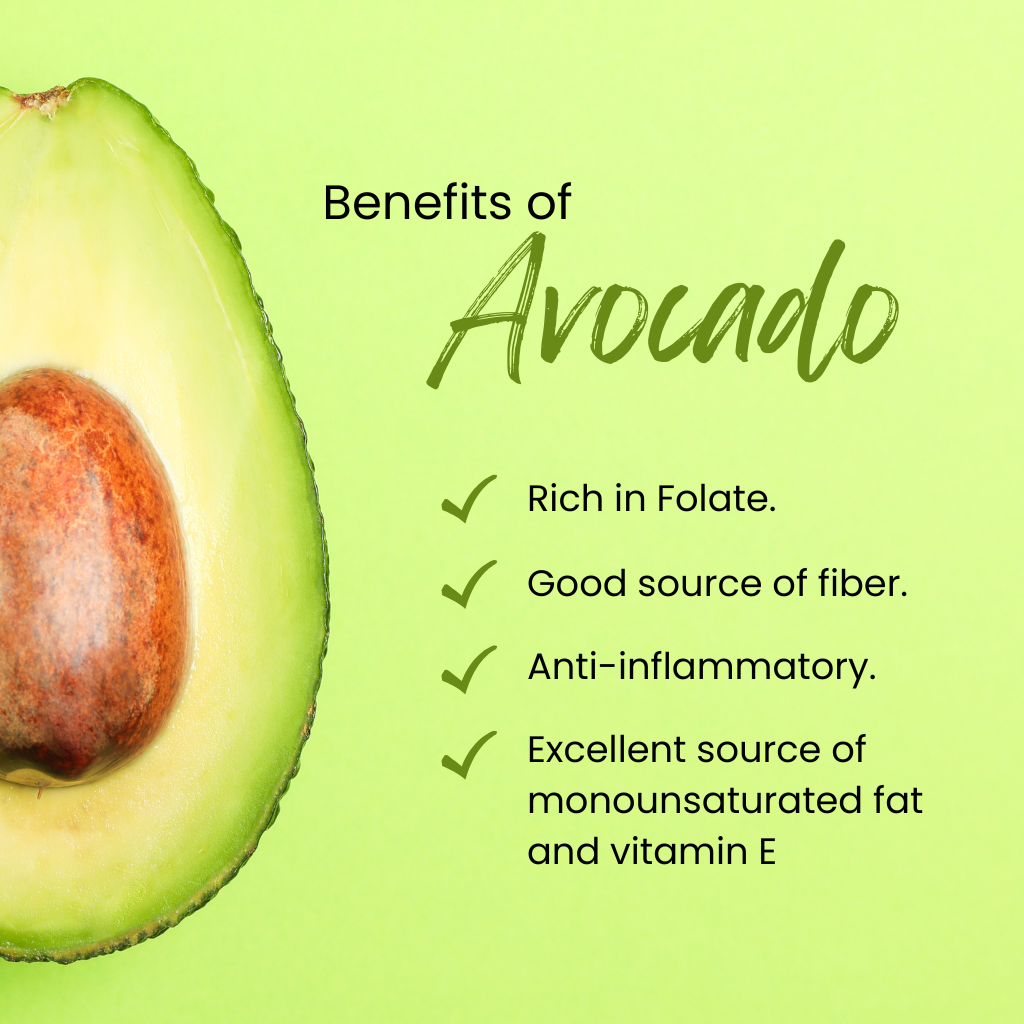Foods to Boost Fertility
Foods to Boost Fertility

Diet plays a significant role in supporting reproductive health. Certain foods are rich in nutrients that enhance hormonal balance, egg and sperm health, and overall reproductive well-being. In this guide, we’ll explore the best foods to boost fertility and why they matter.
Why Nutrition Matters for Fertility
The journey to conception involves many biological processes, from egg maturation to sperm health, ovulation, and implantation. The nutrients we consume can directly affect these processes by:
- Balancing hormones.
- Supporting the quality of eggs and sperm.
- Enhancing blood flow to reproductive organs.
- Reducing inflammation and oxidative stress.
By incorporating fertility-boosting foods into your diet, you’re not only improving your chances of conception but also laying the foundation for a healthy pregnancy.
Top Foods to Boost Fertility
1. Leafy Green Vegetables
Spinach, kale, and Swiss chard are packed with folate, a B-vitamin crucial for fertility and early pregnancy. Folate helps in DNA synthesis and cell division, which are vital during conception.
How to Include: Add leafy greens to salads, smoothies, or stir-fries for a nutrient-dense meal.
2. Berries
Blueberries, strawberries, and raspberries are rich in antioxidants, which combat oxidative stress in reproductive cells. Oxidative stress can harm sperm and egg quality, so reducing it is essential.
How to Include: Snack on berries, mix them into yogurt, or use them as a topping for oatmeal.
3. Fatty Fish
Salmon, mackerel, and sardines are excellent sources of omega-3 fatty acids. These healthy fats improve blood flow to reproductive organs, regulate hormones, and reduce inflammation.
How to Include: Aim for two servings of fatty fish per week, grilled or baked for maximum benefits.
4. Nuts and Seeds
Almonds, walnuts, chia seeds, and flaxseeds are fertility powerhouses. They’re rich in vitamin E, zinc, and omega-3s, all of which support sperm health and hormonal balance.
How to Include: Add a handful of nuts to your snacks or sprinkle seeds on your meals.
5. Whole Grains
Quinoa, brown rice, and oats provide complex carbohydrates, which stabilize blood sugar levels. Balanced blood sugar is crucial for hormonal harmony and ovulation.
How to Include: Replace refined grains with whole grains in your meals for sustained energy and better fertility.
6. Eggs
Eggs are a great source of protein and choline, a nutrient that supports fetal brain development. They also contain vitamin D, which is linked to improved fertility outcomes.
How to Include: Enjoy eggs boiled, scrambled, or in a frittata for a versatile, fertility-friendly meal.
7. Citrus Fruits
Oranges, lemons, and grapefruits are high in vitamin C, which improves sperm quality and motility. These fruits also help the body absorb iron, a vital mineral for reproductive health.
How to Include: Start your day with a glass of fresh orange juice or add citrus segments to your salads.
8. Avocados
Avocados are rich in monounsaturated fats, folate, and potassium, which promote hormonal balance and improve egg quality.
How to Include: Spread avocado on whole-grain toast or add it to smoothies for a creamy texture.
9. Legumes and Lentils
Beans, chickpeas, and lentils are excellent plant-based sources of protein and iron. Iron deficiency can lead to ovulatory issues, so ensuring adequate intake is key.
How to Include: Prepare hearty soups, stews, or salads featuring these nutrient-packed legumes.
10. Full-Fat Dairy
Research suggests that full-fat dairy products may positively influence ovulation compared to low-fat alternatives. Yogurt, cheese, and milk provide calcium and vitamin D, essential for reproductive health.
How to Include: Opt for a serving of full-fat yogurt with added fruits or nuts for a wholesome snack.
Foods to Avoid When Trying to Conceive
While adding fertility-boosting foods is important, it’s equally vital to minimize or avoid certain items that can negatively impact fertility:
- Trans Fats – Found in fried foods and baked goods, trans fats can disrupt ovulation.
- Refined Sugars – Excess sugar can lead to insulin resistance, which affects ovulation.
- Alcohol – Limit alcohol intake as it can impair sperm quality and hormonal balance.
- Caffeine – High levels of caffeine may reduce fertility, so moderate your consumption.
Lifestyle Tips to Complement Your Fertility Diet
- Stay Hydrated: Proper hydration ensures optimal blood flow to reproductive organs. Aim for 8-10 glasses of water daily.
- Exercise Moderately: Regular physical activity helps maintain a healthy weight and reduces stress, both of which are essential for fertility.
- Manage Stress: High stress levels can interfere with ovulation. Incorporate relaxation techniques like yoga, meditation, or deep breathing exercises.
- Prioritize Sleep: Poor sleep can disrupt hormonal balance. Aim for 7-8 hours of quality sleep each night.
The Role of Supplements
While a balanced diet provides most of the necessary nutrients, some individuals may need supplements to address specific deficiencies. Common fertility-related supplements include:
- Folic Acid: Essential for preventing neural tube defects.
- Vitamin D: Supports hormonal health and fertility outcomes.
- Coenzyme Q10 (CoQ10): Boosts egg and sperm quality by reducing oxidative stress.
Consult your healthcare provider before starting any supplements to ensure they’re tailored to your needs.
Building a Fertility-Friendly Meal Plan
meal plan to incorporate fertility-boosting foods into your diet:
Breakfast:
- Whole-grain toast with avocado and a poached egg.
- A side of fresh orange juice.
Snack:
- A handful of almonds and blueberries.
Lunch:
- Spinach and kale salad with grilled salmon, quinoa, and a lemon-olive oil dressing.
Snack:
- Full-fat yogurt topped with chia seeds and raspberries.
Dinner:
- Lentil soup with a slice of whole-grain bread.
- Steamed asparagus and roasted sweet potatoes.
Conclusion
Foods to boost fertility through diet is a holistic and sustainable approach to enhancing your reproductive health. By incorporating nutrient-rich foods like leafy greens, berries, fatty fish, and whole grains, you provide your body with the tools it needs to optimize fertility. Combine these dietary choices with a healthy lifestyle, and you’ll be well on your way to supporting your conception journey.
Remember, while diet plays a crucial role, it’s essential to consult with a healthcare professional for personalized advice tailored to your unique needs. Here’s to nourishing your body and embracing the exciting journey ahead!
Foods to Boost Fertility
Discover foods to boost fertility, learn how nutrition impacts reproductive health & get tips for a…
Avocado benefits
discover the incredible Avocado Benefits! from heart health and glowing skin to improved digestion and brain…
Is Cervical Cancer Genetic?
Cervical cancer isn't usually hereditary, but genetic susceptibility, HPV infection, and lifestyle factors influence risk. Prevention…








